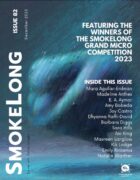One of the things I admired in this piece was that it was all one long sentence. Why did you decide to structure it that way?
I think we needed the panicky, angry, injustice-driven rush of the long sentence because there’s so much surging inside our narrator there’s no room for the breath of a full-stop. I can imagine her living the moment so intensely, her eyes darting about, her heart thwacking inside her ribcage, her body shuddering with the lurch of the train and all those looks, taking her back to that darkest of memories.
Toward the end of the story, we get a glimpse into something terrifying about the narrator’s life. Why did you decide to tell that story through the story of the girl licking the window? What do those two stories say about each other?
The narrator could have said, right, I’m going to tell you about how dented my childhood was, how my mother censored my every word and how often I got sent to the shed. How I was never allowed to be me. But she doesn’t. She can’t. She’s not fully aware of how damaged she is yet. So the girl licking the window is both a trigger that sets our narrator’s memory in motion, making her relive it, and perhaps a shield between the narrator and the traumatic period itself. Also, however unfair the unfolding train scene might be, I think we need to consider our narrator is projecting her own experience of neglect and violence onto the girl, making her visceral reaction understandable, but equally unsettling, given the seemingly humdrum context of a train trip.
Can you imagine this story told from the point of view of the girl’s mother?
I think if I told the story from the perspective of the mother, I would warm to her. Even if I generally don’t see a problem in licking windows, I might understand her reasons for telling her daughter to stop licking, because some germs are nasty and aren’t there to boost your immune system. I probably would feel for the mother who has a child in a buggy and a toddler who’s up to mischief yet again, and she’s got shopping to do, she’s got appointments to get to and needs to keep her shit together. So even the gruff act of pulling her daughter away from the window and the zip digging into her throat might end up being forgivable.
What about from the point of view of the girl?
As a kind of preamble before answering your question, I remember seeing this girl on a train when I was traveling back to Lyon from Paris. Her mum was doing a crossword next to her, and she repeatedly told her to stop licking the window. The girl saw I was looking at her, so I hid my face behind a book but carried on looking at her in the reflection. She was drawing shapes with her tongue; circles, squiggles; it was wonderful. After telling her over and over not to lick, her mum brought out her “if you carry on doing what you’re doing…” artillery which was enough for the girl to stop and turn to her colouring book. Anyway, the fact that I was the one looking at the girl in real life, then, in the space of a few minutes, the one stepping back and creating a narrator with her own parallel story who was in turn looking at the girl adds yet another layer to this odd little story-within-a-story kind of thing! If it had just been from the girl’s point of view, it might have been a story, but the dimension of parallel stories would have been lost.
Why is it so important for the narrator to “let her lick?”
The narrator wants the girl to lick because for her, like babies, licking is a way of getting the world, it’s a way of exploring it, tasting it without the confusion of hand-me-down explanations. It’s a way of self-soothing too. As she watches the girl and sees her tongue taking in all this info – the temperature, texture, shape and size—she sees herself a few years earlier. That’s why the narrator lays into the mother when the latter yanks the girl away from the window, because our narrator had been denied a voice, and she’s releasing the words that should have been directed at her own mother onto an ordinary woman on the train, and in so doing is fiercely protecting the girl’s right to be a child.



 The core workshop of SmokeLong Fitness is all in writing, so you can take part from anywhere at anytime. We are excited about creating a supportive, consistent and structured environment for flash writers to work on their craft in a community. We are thrilled and proud to say that our workshop participants have won, placed, or been listed in every major flash competition. Community works.
The core workshop of SmokeLong Fitness is all in writing, so you can take part from anywhere at anytime. We are excited about creating a supportive, consistent and structured environment for flash writers to work on their craft in a community. We are thrilled and proud to say that our workshop participants have won, placed, or been listed in every major flash competition. Community works.